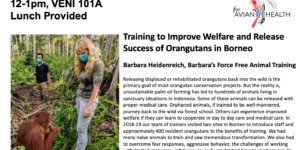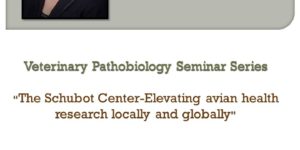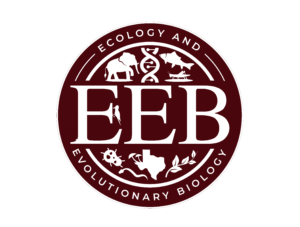The Schubot Center for Avian Health is excited to host the following seminar. All are invited. Looking forward to it!
Wild Bird Outreach Event
WHAT: Wild Bird Outreach Event, hosted by researchers affiliated with the Schubot Exotic Bird Health Center
WHERE: Girl Scouts’ Camp Howdy at 5321 Jones Rd, Bryan, TX. Follow the dirt road after the cattle gate. There will be a trailer park on the other side of the fence to your left but keep going until you see a parking lot before the main gate. Please back your car in. Walk through the main gate and follow the sign to RaNap Shelter where we will be set up.
WHEN: Sunday, December 9, from sun-rise until bird activity slows (best time to join will likely be 7:45 – 10:00am). Come and go as you please. Rain will result in the need to reschedule. Forecast: cold and windy… dress warm.
WHY: Come get some experience and enjoy a morning chatting about birds! Our team will be using mist-nets to capture wild birds for research and teaching purposes. We will demonstrate techniques including: use of mist nets, safe handling of birds, bird identification, applying leg bands, taking biological samples including ticks and blood, and more. Data we collect will be submitted to the federal Bird Banding Laboratory and also contribute to our ongoing investigations of pathogens in birds. Like all work with wildlife, we cannot guarantee any capture success.
If you have questions or wish to let us know you’ll join (or if you wish to get an email if we need to cancel last minute for bad weather), please email Spencer DeBrock, PhD student in the College of Veterinary Medicine and Biomedical Sciences.
EEB Seminar Series Fall 2018 – Postdocs
Postdoc Talks
 Jillian Wormington
Jillian WormingtonOur colony of triatomine bugs, a resource many years in development, presents a unique opportunity to explore understudied aspects of North American triatomine biology, especially those related to transmission of Trypanosoma cruzi, causative agent of Chagas disease. We have found key differences in wing morphology between T. cruzi infected and uninfected triatomines, with implications for human and animal disease risk. Ongoing projects include comparing diel activity patterns in infected and uninfected triatomines, estimating vector competence using experimental infections with local strains of T. cruzi, and indirect xenodiagnosis using domestic dog and non-human primate blood.
Hosted by EEB
Seminar: Sarah Hamer
12:00 p.m.
Room VENI 107 B
Hosted By: Dr. Ramesh Vemulapalli
EEB Series Seminar: Dr. Sarah Hamer
Dr. Sarah Hamer, Department of Veterinary Integrative Biosciences, Texas A&M University College of Veterinary Medicine
Title: “Chagas disease ecology at the intersection of human, animal, and vector populations”
Abstract: The maintenance of vector-borne zoonotic pathogens in nature is often sustained by cryptic transmission among wildlife reservoirs with occasional spillover to humans. I will present my lab’s research program on the ecology of Chagas disease, a significant heart disease and cause of death in humans and dogs across Latin America that is increasingly recognized in the southern United States. The disease is caused by infection with a protozoan parasite (Trypanosoma cruzi) that is spread by bloodfeeding Triatomine ‘kissing’ bugs. Our citizen science program is empowering the public and medical community and has resulted in the submission of over 1800 kissing bugs from across the southern states; these bugs are characterized by over 60% infection prevalence. We are comparing parasite strains that circulate among bugs and various wildlife species to those we have isolated from dogs that died of Chagas cardiomyopathy. In contrast to current media hype about invasion across the border, I will discuss the endemicity of the components of the Chagas pathosystem in the southern states.






